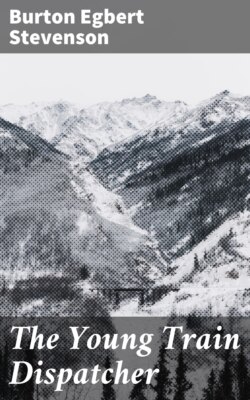Читать книгу The Young Train Dispatcher - Burton Egbert Stevenson - Страница 9
На сайте Литреса книга снята с продажи.
CHAPTER VI
ОглавлениеTable of Contents
A PRIVATE LINE
The conductor of Number Two, having consoled and encouraged his passengers to the best of his ability, went forward into the smoker and sat down in a corner seat to sort his tickets and make up his report. From time to time, he glanced out the window, and though the driving snow shut off any glimpse of the landscape, he could tell, by a sort of instinct, just where the train was. He knew the rattle of every switch, the position of every light. The quick rattle of a target told him that the train had passed Harper’s. He recognized the clatter of the switches at Roxabel as the train swept over them; then, from the peculiar echo, he knew that it had entered a cut and that Musselman was near. Then the train struck another cut, whirred over a bridge, and began to coast down a long grade, while the shrill blast of the whistle sounded faintly through the storm, and he knew that they were approaching Wadsworth. The lights of the city would have been visible upon the right but for the swirling snow. There was a sharp repeated roar as the train shot over the two iron bridges at the city’s boundary—and then there came a shock which shook the train from end to end, and sent the parcels flying from the wall-racks.
Instantly the conductor swung up his feet and braced himself against the seat in front of him. He knew that that sudden setting of the brakes meant danger ahead, and he wanted to be prepared for the crash which might follow. It is a trick which every trainman knows and which every passenger should know. The passengers who are injured in a collision are usually those who were sitting carelessly balanced on the edge of their seats, and who, when the crash came, were hurled about the car, with the inevitable result of broken bones. To trainmen and experienced travellers, the unmistakable shock which tells of brakes suddenly applied is always a signal to brace themselves against the more violent one which may follow in a moment. Often this simple precaution means all the difference between life and death.
But in this case, the train came shrieking to a stop without any shock more violent than the first, and the conductor hastened out to investigate. He found the engineer and fireman standing in front of the engine, staring at a fusee burning red in the darkness, and questioning a young fellow who stood near by.
“What is it?” demanded the conductor, hurrying up.
“This here youngster says he had orders t’ flag th’ train,” answered the engineer.
“Orders from whom?” asked the conductor sharply, turning to the boy.
“Orders from—”
The boy stopped and turned red.
“Well, go on. Who gave the orders?”
“A chum of mine,” burst out the boy desperately. “He works in the trainmaster’s office. He wired me a minute ago to flag Number Two and be quick about it. I just had time to get that fusee lighted when you whistled for the crossing.”
The conductor frowned. The whole affair savoured of a boyish prank.
“And do you mean to say,” he demanded, sternly, “that because another boy told you to, you stopped this train—”
He paused, his mouth open, and listened, hand to ear. Then he stooped, snatched up the fusee, and fairly hurled himself down the track, waving the blazing torch above his head. And an instant later, his companions caught the sound of an engine pounding up the grade toward them.
The red light disappeared through the snow; then two sharp whistles testified that the signal had been seen; and a moment later, a great mogul of a freight-engine loomed through the darkness and came grinding to a stop not thirty feet away.
Her engineer swung himself to the ground and came running forward.
